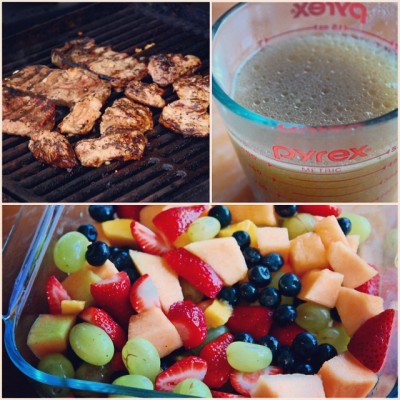8 common nutrition mistakes

I have been helping many clients with their training and nutrition for quite a few years now, both online and face to face, and there are some common nutritional mistakes I see over and over again. Now some people don’t really care about how they look as long as they are healthy, and if that is you then this post won’t interest you. I wanted to write this for those who want to change their body composition a little, maybe lose some fat, show some visible muscle, etc. Each point might not apply to every single person, but hopefully you will be able to take a tip or two out of this post that might help you out a little.
1) You thought you could out-train a poor diet:
Many people can PERFORM well on a poor diet to an extent. They can probably improve their lifts and times for workouts; they can do well in certain sports etc. But few people can LOOK great on one. For every one or two genetically gifted or drug-enhanced person that can get away with a crappy diet and still look and perform amazingly well, there are a whole heap more who can’t. Just because you have started training consistently and are making progress in the gym, that doesn’t mean you are going to get the results you want body-wise. Diet plays a huge factor in your body composition.
2) You are eliminating or severely restricting an entire food group, i.e. fats, or carbs etc.
Maybe it was all the rage to combine low/no carbs with high volume and/or high intensity anaerobic training, so you tried this for awhile but in doing this have not gotten the results you wanted. Why? Because this is literally a recipe for burning muscle and looking skinny-fat (not to mention suffering side effects like poor energy/a lack of recovery).
The same could be said for not including enough fats in your diet. This can cause serious hormonal problems, which will affect your weight and body composition in the long-term.
In order to get the body shape results you want, you need to eat a balanced diet. I know, I know, this is kind of boring to hear. Eating a balanced diet is not in fashion on “Fitstagram” or in the diet world, but it works. You don’t want to cut entire food groups out of your diet for no good reason. You need to find your sweet spot with well-balanced macronutrients. It will be different for everyone. Some people will respond better to higher fat and others to higher carbs. But the fact still remains that you will probably get the best results if you consume a balanced diet.
3) Your diet is not sustainable in the long-term
Thinking about trying the cabbage soup diet? Or the lemon detox diet? Well ask yourself first, is that sustainable in the long-term? Any nutritional changes you make should be sustainable and for the long-term. Obviously if you want to see results, you will have to make some changes to your current lifestyle, but it should still be sustainable and it doesn’t have to mean living on chicken soup and cauliflower rice for the rest of your life.
4) Snacking too much on “empty” calorie/carb foods
A lot of people (ladies I am looking at you here) eat way too many carbohydrates in the form of extra snacks here and there. Most people’s idea of a snack is something like some biscuits, a chocolate bar, some lollies, etc. You should not be continually eating throughout the day. Your body should feel hungry each day before your meals. This is a healthy and natural sensation to feel.
Constantly snacking is not “good for our metabolism”, unlike what you may have probably been told before. It wreaks havoc on your blood sugar and also interferes with your true hunger signals (a big issue IMO). It also adds on hundreds of extra sneaky calories, which many times end up not being accounted for.
Often times my clients have told me what they eat for their 3 meals and their allotted snacks, and they stick to their portion sizes, but they fail to mention the lollies and biscuits/chocolates at their desk that they continually snack on. If you are trying to stick to a daily calorie intake you need to account for everything you eat, otherwise your results will be affected.
5) Not eating enough vegetables
Vegetables used to be so much more popular. In recent times and with all the extra supplements, powders, shakes etc., it seems vegetables have lost their popularity, which is really sad, because vegetables are so important. Many people are so focused on hitting their macronutrient targets that they forget about the importance of vegetables/micronutrients. I have been studying nutrition and my current unit is all about micronutrients, fruit and vegetables and cooking methods that preserve nutrients in foods, etc, so I am full of my subject at the moment.
So why are vegetables so important to include in your diet? Well for starters they play a huge role in helping with your recovery as they are full of minerals and vitamins that your body needs to help rebuild it when it is in a broken down state (after hard training sessions). Remember, you are only as good as how well you can recover and this will affect your body composition in the long run as well. Vegetables are also a good choice to fill up on when you are in a calorie deficit, as they are low in calories but very high in fibre and vitamins.
6) Not eating your carbs/proteins at the optimal times
Now this one is not a deal-breaker, and the general public probably doesn’t need to worry about it, but it’s more a tip for athletes or serious exercisers looking to “recomp” their body a little bit.
Even though many athletes are in fact eating the correct amount of carbohydrates and proteins, they are consuming them at the wrong times. You should be having the bulk of your carbohydrates pre- and post-workout. If you are trying to lose fat, you can easily survive on having a little bit pre-workout (not a massive meal) and saving the rest for post-workout only.
I can’t tell you how many times I have had clients who train in the evening tell me they eat all their carbs in the morning or vice versa. I understand that some people enjoy having carbs at certain times, and for others it’s inconvenient (i.e. if you are going to work straight after training etc) but for the best results you should be eating the bulk of your carbs post-workout. Without having carbs post-workout, your muscles remain in a depleted state and your body breaks down its own muscle mass to refuel. If you are eating in a deficit this becomes even more important.
If you can, try to eat a meal or have a shake that is full of protein AND carbohydrates post-workout. The protein will help to repair your muscle cells after they have been damaged by lifting weights, and the carbohydrates replenish your glycogen stores from high intensity metabolic training. This is especially true for CrossFitters who generally do both types of training in a single session.
7) Bingeing on food
If you often find yourself bingeing, it is almost always your body’s way of telling you that you are not eating enough calories. Often, it results from a lack of complex carbohydrates. Many of the ladies I have coached were having problems binging because they were not eating enough carbs throughout the day and they would get stuck with a huge urge to binge on simple carbs at night. As soon as I got them eating some oats for breakfast and some rice or potato for lunch, their urge greatly diminished.
8) Obsessing about your diet/your body too much
While I realise that I just gave you a bunch of tips relating to your diet here, at the same time I believe that overly obsessing about your diet and your body will be counterproductive. Try to focus on eating healthy, fresh, home cooked foods, eating for performance, being kind to yourself, and appreciating your body for what it can do for you. Many of my clients who had a mindset change found that that is when their physique start to change for the better. When you stop stressing about food and talking negatively to your body, it responds well. Imagine that! :)
Join the other 10,000+ who get my best fitness, diet & mindset tips.



Comments